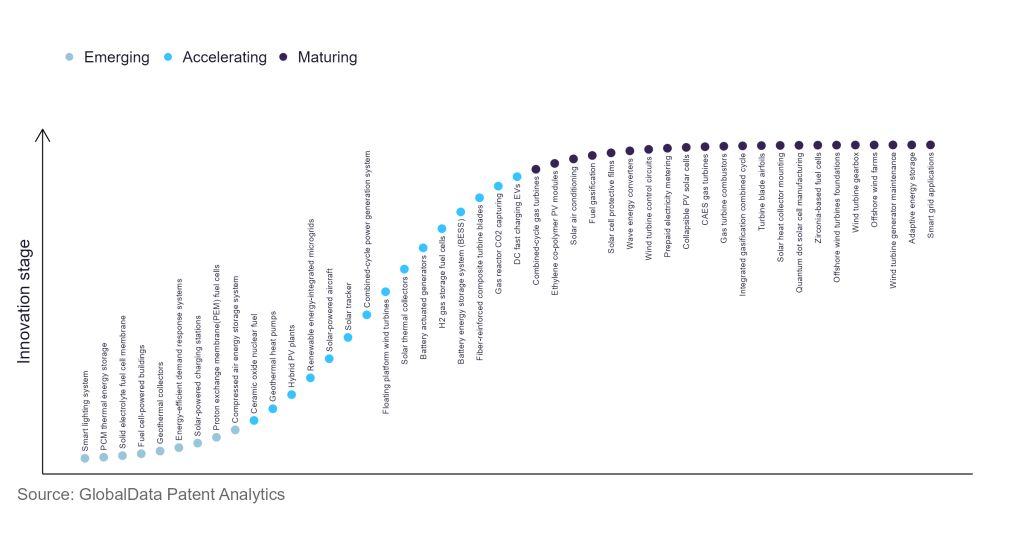The power industry continues to be a hotbed of innovation, with activity driven by fuel availability, higher efficiency, desire to reduce greenhouse gas emissions, reliability and growing importance of technologies such as Polymer electrolyte membrane (PEM), Alkaline (AFC), Solid oxide (SOFC) and Molten carbonate (MCFC). In the last three years alone, there have been over 439,000 patents filed and granted in the power industry, according to GlobalData’s report on Environment Sustainability in Power: Fuel cell powered buildings. Buy the report here.
However, not all innovations are equal and nor do they follow a constant upward trend. Instead, their evolution takes the form of an S-shaped curve that reflects their typical lifecycle from early emergence to accelerating adoption, before finally stabilising and reaching maturity.
Identifying where a particular innovation is on this journey, especially those that are in the emerging and accelerating stages, is essential for understanding their current level of adoption and the likely future trajectory and impact they will have.
90+ innovations will shape the power industry
According to GlobalData’s Technology Foresights, which plots the S-curve for the power industry using innovation intensity models built on over 83,000 patents, there are 90+ innovation areas that will shape the future of the industry.
Within the emerging innovation stage, smart lighting system, PCM thermal energy storage, and solid electrolyte fuel cell membrane are disruptive technologies that are in the early stages of application and should be tracked closely. Ceramic oxide nuclear fuel, geothermal heat pumps, and hybrid PV plants are some of the accelerating innovation areas, where adoption has been steadily increasing. Among maturing innovation areas are combined-cycle gas turbines and ethylene co-polymer PV modules, which are now well established in the industry.
Innovation S-curve for environmental sustainability in the power industry

Fuel cell powered buildings is a key innovation area in environmental sustainability
A fuel cell is an electrochemical device that converts chemical potential energy into electrical energy. Fuel cells are often used as a power source for buildings and other structures. Fuel cells are a clean and efficient way to generate electricity.
GlobalData’s analysis also uncovers the companies at the forefront of each innovation area and assesses the potential reach and impact of their patenting activity across different applications and geographies. According to GlobalData, there are 30+ companies, spanning technology vendors, established power companies, and up-and-coming start-ups engaged in the development and application of fuel cell powered buildings.
Key players in fuel cell powered buildings – a disruptive innovation in the power industry
‘Application diversity’ measures the number of different applications identified for each relevant patent and broadly splits companies into either ‘niche’ or ‘diversified’ innovators.
‘Geographic reach’ refers to the number of different countries each relevant patent is registered in and reflects the breadth of geographic application intended, ranging from ‘global’ to ‘local’.
Patent volumes related to fuel cell powered buildings
Source: GlobalData Patent Analytics
Leaders in fuel cell include FuelCell Energy and Panasonic.
FuelCell Energy is a global leader in manufacturing stationary fuel cell energy platforms for decarbonising power and producing hydrogen to enable a world empowered by clean energy. FuelCell Energy and TuNur signed an MoU to integrate FCE’s leading fuel cell and electrolyser technologies.
Panasonic has developed a pure hydrogen fuel cell generator, which generates power through chemical reaction with high-purity hydrogen and oxygen in the air.
To further understand the key themes and technologies disrupting the power industry, access GlobalData’s latest thematic research report on Power.
Data Insights
From

The gold standard of business intelligence.
Blending expert knowledge with cutting-edge technology, GlobalData’s unrivalled proprietary data will enable you to decode what’s happening in your market. You can make better informed decisions and gain a future-proof advantage over your competitors.



